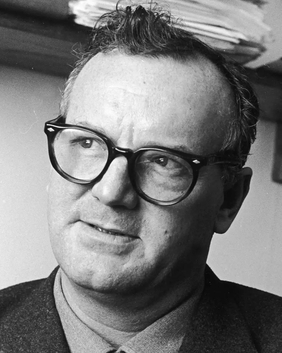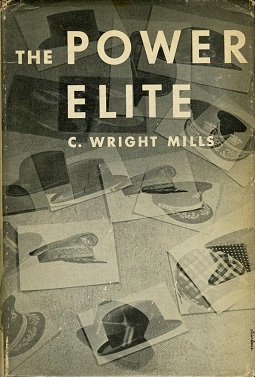
In the United States, White Anglo-Saxon Protestants (WASP) is a sociological term which is often used to describe white Protestant Americans of Northwestern European descent, who are generally part of the white dominant culture or upper-class and historically often the Mainline Protestant elite. Historically or most consistently, WASPs are of British descent, though the definition of WASP varies in this respect. WASPs have dominated American society, culture, and politics for most of the history of the United States. Critics have disparaged them as "The Establishment". Although the social influence of wealthy WASPs has declined since the 1960s, the group continues to play a central role in American finance, politics, and philanthropy.

Conflict theories are perspectives in political philosophy and sociology which argue that individuals and groups within society interact on the basis of conflict rather than agreement, while also emphasizing social psychology, historical materialism, power dynamics, and their roles in creating power structures, social movements, and social arrangements within a society. Conflict theories often draw attention to power differentials, such as class conflict, or a conflict continuum. Power generally contrasts historically dominant ideologies, economies, currencies or technologies. Accordingly, conflict theories represent attempts at the macro-level analysis of society.

Political sociology is an interdisciplinary field of study concerned with exploring how governance and society interact and influence one another at the micro to macro levels of analysis. Interested in the social causes and consequences of how power is distributed and changes throughout and amongst societies, political sociology's focus ranges across individual families to the state as sites of social and political conflict and power contestation.
Upper class in modern societies is the social class composed of people who hold the highest social status, usually are the wealthiest members of class society, and wield the greatest political power. According to this view, the upper class is generally distinguished by immense wealth which is passed on from generation to generation. Prior to the 20th century, the emphasis was on aristocracy, which emphasized generations of inherited noble status, not just recent wealth.

Charles Wright Mills was an American sociologist, and a professor of sociology at Columbia University from 1946 until his death in 1962. Mills published widely in both popular and intellectual journals, and is remembered for several books, such as The Power Elite, White Collar: The American Middle Classes, and The Sociological Imagination. Mills was concerned with the responsibilities of intellectuals in post–World War II society, and he advocated public and political engagement over disinterested observation. One of Mills's biographers, Daniel Geary, writes that Mills's writings had a "particularly significant impact on New Left social movements of the 1960s era." It was Mills who popularized the term New Left in the U.S. in a 1960 open letter, "Letter to the New Left".

George William "Bill" Domhoff is a Distinguished Professor Emeritus and research professor of psychology and sociology at the University of California, Santa Cruz, and a founding faculty member of UCSC's Cowell College. He is best known as the author of several best-selling sociology books, including Who Rules America? and its seven subsequent editions.

The New World Order (NWO) is a term used in several conspiracy theories which hypothesize a secretly emerging totalitarian world government. The common theme in conspiracy theories about a New World Order is that a secretive power elite with a globalist agenda is conspiring to eventually achieve world domination and rule the world through an authoritarian one-world government—which will replace sovereign nation-states—and an all-encompassing propaganda whose ideology hails the establishment of the New World Order as the culmination of history's progress. Many influential historical and contemporary figures have therefore been alleged to be part of a cabal that operates through many front organizations to orchestrate significant political and financial events, ranging from causing systemic crises to pushing through controversial policies, at both national and international levels, as steps in an ongoing plot to achieve world domination.
In sociology and in political science, the term The Establishment describes the dominant social group, the elite who control a polity, an organization, or an institution. In the praxis of power, The Establishment usually is a self-selecting, closed elite entrenched within specific institutions — hence, a relatively small social class can exercise all socio-political control.

Social stratification refers to a society's categorization of its people into groups based on socioeconomic factors like wealth, income, race, education, ethnicity, gender, occupation, social status, or derived power. It is a hierarchy within groups that ascribe them to different levels of privileges. As such, stratification is the relative social position of persons within a social group, category, geographic region, or social unit.

Sociology as a scholarly discipline emerged, primarily out of Enlightenment thought, as a positivist science of society shortly after the French Revolution. Its genesis owed to various key movements in the philosophy of science and the philosophy of knowledge, arising in reaction to such issues as modernity, capitalism, urbanization, rationalization, secularization, colonization and imperialism.

The Power Elite is a 1956 book by sociologist C. Wright Mills, in which Mills calls attention to the interwoven interests of the leaders of the military, corporate, and political elements of society and suggests that the ordinary citizen in modern times is a relatively powerless subject of manipulation by those three entities.

In political and sociological theory, the elite are a small group of powerful people who hold a disproportionate amount of wealth, privilege, political power, or skill in a group. Defined by the Cambridge Dictionary, the "elite" are "the richest, most powerful, best-educated, or best-trained group in a society."

Two or more corporations have interlocking directorates when they share members of their boards of directors or each shares directors with a third firm. A person that sits on multiple boards is known as a multiple director. Two firms have a direct interlock if a director or executive of one firm is also a director of the other, and an indirect interlock if a director of each sits on the board of a third firm.
In philosophy, political science and sociology, elite theory is a theory of the State that seeks to describe and explain power relationships in society. The theory posits that a small minority, consisting of members of the economic elite and policymaking networks, holds the most power—and that this power is independent of democratic elections.
Fred L. Block is an American sociologist, and Research Professor of Sociology at UC Davis. Block is widely regarded as one of the world’s leading economic and political sociologists. His interests are wide ranging. He has been noted as an influential follower of Karl Polanyi.
Charles Derber is an American Professor of Sociology at Boston College. His work focuses on the crises of capitalism, globalization, corporate power, neo-fascism, American militarism, the culture of hegemony, the climate crisis, and the new peace and global justice movements.

Fat cat is a political term originally describing a rich political donor, also called an angel or big-money man.
The transnational capitalist class (TCC), also known as the transnational capitalist network (TCN), in neo-Gramscian and Marxian-influenced analyses of international political economy and globalization, is the global social stratum that controls supranational instruments of the global economy such as transnational corporations and heavily influences political organs such as the World Trade Organization.

John Peter Scott is an English sociologist working on issues of economic and political sociology, social stratification, the history of sociology, and social network analysis. He is currently working independently, and has previously worked at the Universities of Strathclyde, Leicester, Essex, and Plymouth. He is a Fellow of the British Academy, a Fellow of the Royal Society of Arts, and a Fellow of the Academy of Social Sciences. He has been a member of the British Sociological Association since 1970. In 2015 he became Chair of Section S4 of the British Academy. In 2016 he was awarded an Honorary Doctorate of Essex University.
The Invisible Class Empire is a term introduced by Robert Perrucci and Earl Wysong in their book titled, The New Class Society: Goodbye American Dream? The term refers to members of the superclass that are involved in shaping both political and corporate policies. This class of people may be thought of as an empire because members maintain an influence on society through access to a surplus of financial, cultural, human and social capital. These various forms of capital translate into the political force needed to preserve classwide vested interests. Unlike conspiracy theories of power and control, the superclass' political influence is evidenced in the reality of economic and political inequalities that maintain class hierarchies. The term, therefore, refers to "the hidden structures and processes through which superclass leaders, along with their credentialed-class allies, penetrate and dominate the American political system." The empire is "invisible" because many of the individuals involved receive very little or no public attention.











